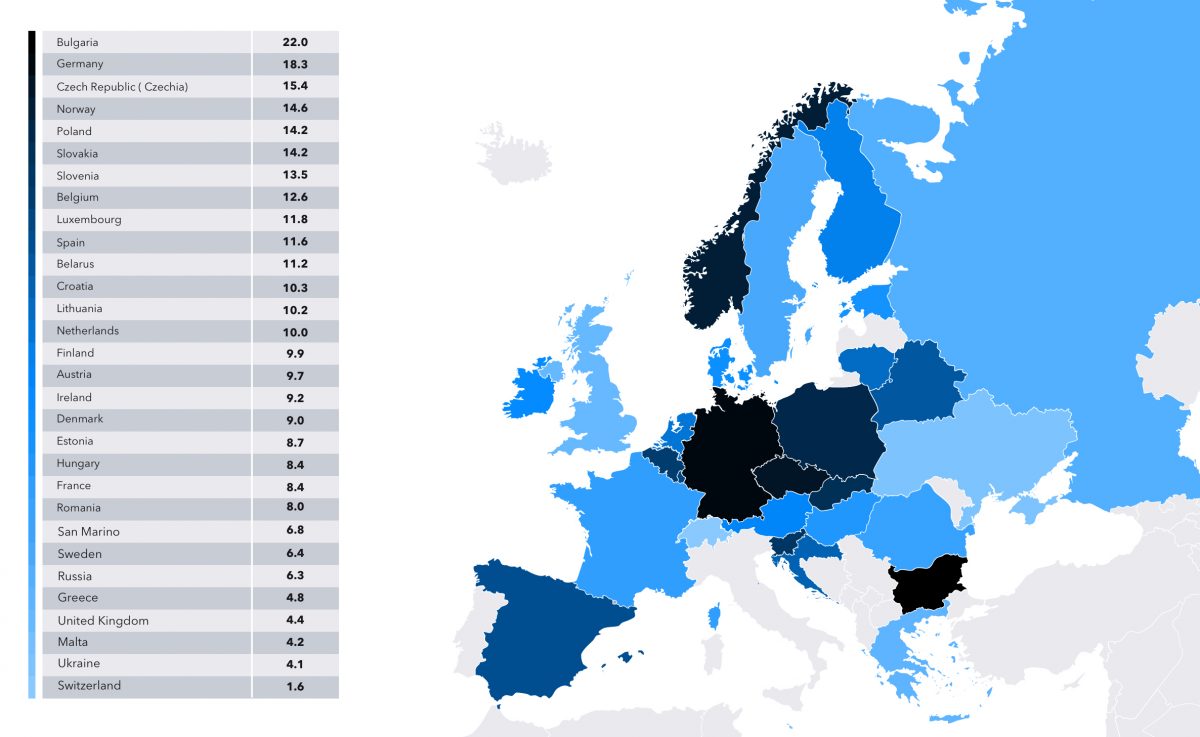Mitrefinch research shows British construction workers rank 4th in turning up for work
British workers took the fourth lowest amount of sick days in Europe last year, according to new research by Mitrefinch that identifies the countries most and least notorious for pulling a sickie.
Despite construction workers taking the highest proportion of sick days across sectors due to accidents at work, the research from time and workforce management solutions provider Mitrefinch, found that workers in the UK took the fourth lowest amount of days off sick when compared to the rest of Europe in 2018, an average of 4.4 days.
Switzerland topped the charts when it came to excellent attendance with its workers taking just 1.6 days sick leave on average over the course of a calendar year. Ukraine (4.1 days) and Malta (4.2 days) made up the rest of the top three.
While the stats for Swiss workers are impressive, it’s important to note that companies in the country are also notoriously generous when it comes to annual leave entitlement – the average worker took over five weeks holiday according to recent statistics – making the efforts by injured British construction workers even more impressive.
However, recent figures suggest that more than two thirds of UK workers avoid taking sick days and still go into work when feeling unwell. These worrying figures could imply construction workers feel pressured to attend work when injured or sick, linking back to corporate culture and attitudes across different nations.
Bulgarian employees were found most likely to call in sick, taking on average 22 days off per year according to the most recent figures available. Workers in Germany didn’t fare too much better taking 18.3 days, with those in the Czech Republic also taking off the equivalent of more than three working weeks with sickness (15.4 days).

Average days sick leave per year by Country:
- Switzerland – 1.6
- Ukraine – 4.1
- Malta – 4.2
- United Kingdom – 4.4
- Greece – 4.8
- Russia – 6.3
- Sweden – 6.4
- San Marino – 6.8
- Romania – 8.0
- France – 8.4
- Hungary – 8.4
- Estonia – 8.7
- Denmark – 9.0
- Ireland – 9.2
- Austria – 9.7
- Finland – 9.9
- Netherlands – 10.0
- Lithuania – 10.2
- Croatia – 10.3
- Belarus – 11.2
- Spain – 11.6
- Luxembourg – 11.8
- Belgium – 12.6
- Slovenia – 13.5
- Slovakia – 14.2
- Poland – 14.2
- Norway – 14.6
- Czech Republic (Czechia) – 15.4
- Germany – 18.3
- Bulgaria – 22.0
Commenting on the figures, Matthew Jenkins, CEO at Mitrefinch, said: “Workplace absences cost the UK economy a whopping £18 billion a year through lost productivity, with this figure expected to creep up to £21 billion in 2020 – causing significant losses for the construction industry as a whole. On top of the dip in productivity, construction employees who repeatedly call in sick put a strain on other members of staff who have to pick up their workload, often physical labour, which can impact workplace morale.
“However, that’s not to say taking a sick day should be seen as a weakness or a lack of commitment. Taking time out of a construction job to recover from injury or illness is integral to the productivity and growth of the industry and the fact that more than two thirds of UK workers admit going to work when feeling sick is a serious cause for concern.”
Lizzie Benton, culture consultant at Liberty Mind, adds: “In Britain we still live by outdated legacy attitudes in the workplace. Fear and control is what many organisations are run by and for employees, asking for a day off sick is like showing a weakness, or admitting a failure. We all think we should ‘keep calm and carry on’.
“It’s not just the act of taking a day off, but the repercussions this may have when an employee returns to work. Managers treating them coldly, or over-questioning their day off as if to assume they were faking it in some way.
“I think managers often behave this way because it is bred in the company culture. Attitudes and behaviours start at the top, and if you have a boss who comes in no matter how they’re feeling you create a culture where people feel they can’t take a sick day. Trust is also a key issue. There are many organisations who have trust issues with their employees and which have policies to control their people rather than help them thrive. Too many businesses still believe that people are just there for the pay cheque and will do anything to get the most out of the company. There is no empathy and a severe lack of emotional intelligence.”
View the full results of this research here.





























